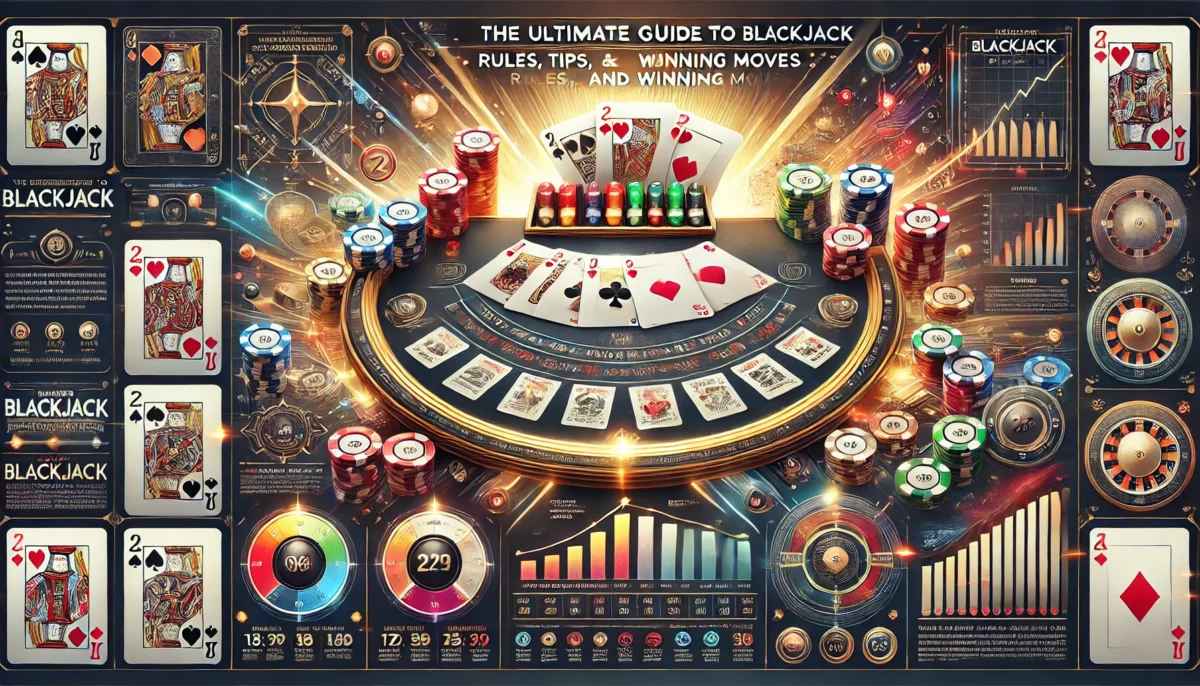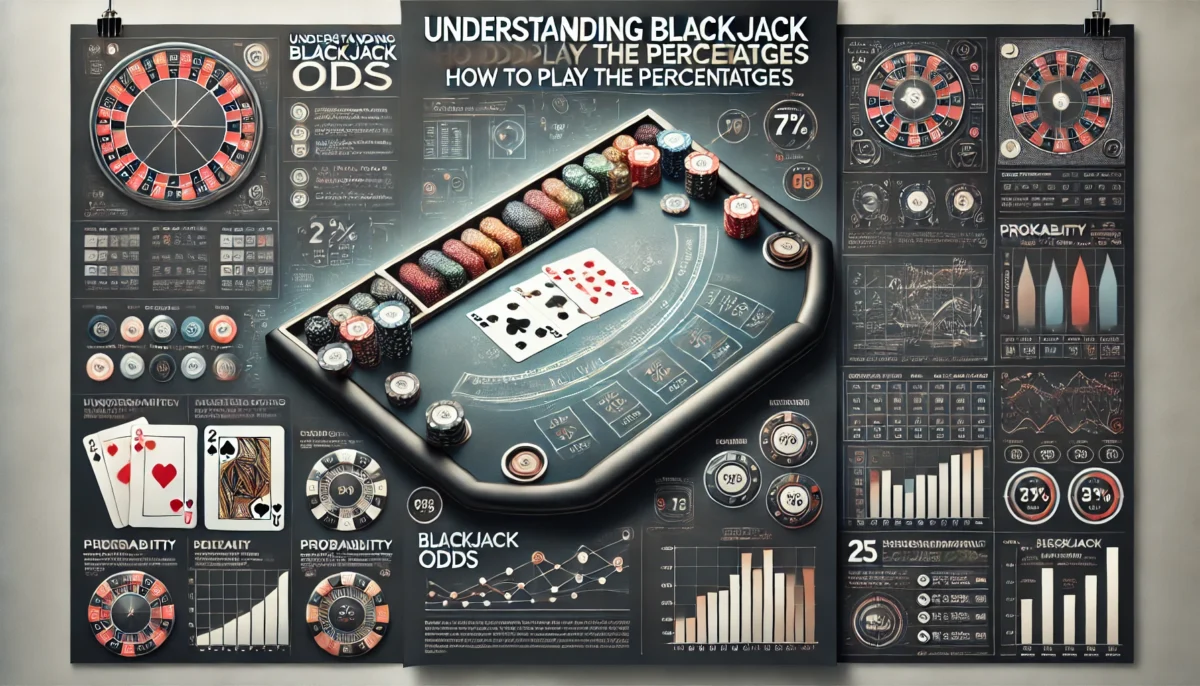Blackjack, often referred to as “21,” is one of the most popular and enduring casino games worldwide. Combining elements of luck and skill, it offers players the unique opportunity to influence the outcome through smart decision-making. Whether you’re a novice learning the ropes or a seasoned player looking to refine your strategy, this comprehensive guide will walk you through the rules, essential tips, and winning moves to help you master the game.
What Is Blackjack?
Blackjack is a card game where the objective is simple: beat the dealer without exceeding a hand value of 21. Played with one or more standard decks of 52 cards, blackjack pits players against the house in a battle of strategy and luck.
Key Goals in Blackjack:
- Achieve 21: A hand total of 21, achieved with two cards (an Ace and a 10-value card), is called a “blackjack” and typically pays out at 3:2.
- Beat the Dealer: End the round with a hand total higher than the dealer’s without exceeding 21.
- Avoid Busting: If your hand exceeds 21, you automatically lose, regardless of the dealer’s hand.
Basic Rules of Blackjack
Understanding the rules is the foundation of any successful blackjack strategy.
Card Values
- Number cards (2-10): Face value.
- Face cards (Jack, Queen, King): 10 points each.
- Ace: 1 or 11 points, depending on which benefits the hand.
Gameplay
- Placing Bets: Players place their wagers before any cards are dealt.
- Dealing Cards: Each player and the dealer receive two cards. The dealer’s second card, called the “hole card,” is dealt face-down.
- Player Decisions: Players can choose to:
- Hit: Take another card to improve their hand.
- Stand: Keep their current total and end their turn.
- Double Down: Double their initial bet and receive only one additional card.
- Split: If dealt two identical cards, split them into two separate hands, placing an additional bet equal to the original wager.
- Dealer’s Turn: The dealer reveals their hole card and must play according to house rules, typically hitting on 16 or less and standing on 17 or more.
- Payouts: Winnings are paid out based on the player’s hand relative to the dealer’s.
Blackjack Strategies for Winning
1. Master Basic Strategy
Basic strategy is a mathematically proven guide for making the best possible decision in any situation. By following a basic strategy chart, players can reduce the house edge to as low as 0.5%.
Key Principles of Basic Strategy:
- Hit or Stand:
- Hit when your total is low (e.g., 11 or less).
- Stand on 17 or higher, unless the dealer shows a strong card.
- Double Down:
- Double down on 10 or 11 when the dealer’s upcard is weak (2-6).
- Split Pairs:
- Always split Aces and 8s.
- Never split 10s or 5s.
2. Manage Your Bankroll
Effective bankroll management ensures you can play for extended periods and weather losing streaks.
- Set a budget before you start playing.
- Avoid betting more than 5% of your total bankroll on a single hand.
- Walk away when you’ve reached your win or loss limit.
3. Use Card Counting (When Possible)
Card counting is a strategy that tracks the ratio of high to low cards remaining in the deck. By keeping a running count, players can adjust their bets and decisions based on the deck’s composition.
How Card Counting Works:
- Assign values to cards:
- Low cards (2-6): +1
- High cards (10, J, Q, K, A): -1
- Neutral cards (7-9): 0
- Increase your bets when the count is positive, indicating a higher proportion of high cards in the deck.
Common Blackjack Mistakes to Avoid
Even experienced players make mistakes that can cost them at the table. Avoid these common pitfalls to improve your odds:
- Ignoring Basic Strategy: Deviating from basic strategy increases the house edge.
- Chasing Losses: Emotional betting leads to poor decisions and depleted bankrolls.
- Overvaluing Hand Totals: Focus on the dealer’s upcard as much as your own hand.
- Taking Insurance Bets: Unless you’re counting cards, insurance bets are rarely profitable.
Advanced Tips and Winning Moves
1. Learn Dealer Behavior
The dealer’s actions are governed by strict rules, but observing their tendencies can still provide valuable insights. For example, some dealers may accidentally reveal their hole card during gameplay.
2. Exploit Favorable Rules
Choose tables with favorable conditions, such as:
- Dealer stands on soft 17.
- Doubling down after splitting is allowed.
- Fewer decks in play.
3. Play Live Dealer Games Online
Online live dealer blackjack combines the convenience of digital gaming with the realism of a physical casino. It’s an excellent way to practice advanced strategies like card counting.
Blackjack Odds and Payouts
Understanding the probabilities in blackjack can help you make informed decisions:
| Action | Odds |
|---|---|
| Drawing a 10-value card | ~30.76% |
| Getting a Blackjack | ~4.8% |
| Dealer Busting on 2-6 | 35-42% (varies by upcard) |
Payouts:
- Blackjack: 3:2 (some tables offer 6:5, which should be avoided).
- Standard Win: 1:1.
- Insurance: 2:1 (not recommended for most players).
Online vs. Live Blackjack
Advantages of Online Blackjack:
- Play anytime, anywhere.
- Lower minimum bets and free play modes.
- Wide variety of game variants, such as Spanish 21 or Progressive Blackjack.
Advantages of Live Blackjack:
- Immersive casino atmosphere.
- Opportunities to observe dealer behavior and table dynamics.
- Slower pace allows for more thoughtful decision-making.
Building a Winning Mindset
Blackjack isn’t just about strategy; it’s also a mental game. Developing the right mindset can help you stay focused and disciplined.
Tips for a Winning Mindset:
- Stay Calm: Don’t let emotions influence your decisions.
- Be Patient: Success in blackjack comes from consistency, not impulsive moves.
- Focus on the Long Game: Short-term losses are part of the process; stick to your strategy for long-term gains.
Practice Makes Perfect
To master blackjack, practice is essential. Use free online games to refine your skills and test strategies without financial risk. Once confident, move to low-stakes tables to gain real-world experience.
Conclusion
Blackjack is a game of skill, strategy, and discipline. By mastering the rules, implementing proven tips, and avoiding common mistakes, you can significantly improve your odds of success. Whether you’re playing at a physical casino or online, approach each session with a clear strategy, manage your bankroll wisely, and enjoy the thrill of the game.
With practice and patience, you’ll not only enhance your blackjack skills but also maximize your chances of walking away a winner.

